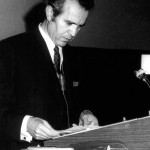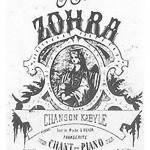Born in Beirut in 1953, Bernard Moussali passed away prematurely at the age of 43 in Paris on the 31st of July 1996. Associate Professor of Arab Literature, and Lecturer at the Sorbonne, he had dedicated his research to Arab Music, with an open-mindedness he passionately defended. Born to a Syrian-Lebanese father and a Belgian mother, he carried within a multiculturality that was at the core of his too short scientific career.
Gifted with an uncommon spirit of enquiry and with rare erudition, attentive reader of Ṭabarī, of ‘Abd al-Ghanī al-Nābulsī as well as of Umberto Eco or simply of crime novels, Bernard Moussali was known for his often categorical judgements and his quick wit that made of him and intellectual who was admired as much as he was feared. He published very little, always reworking the texts he patiently prepared. In the field of Arab Literature, we only know of a single course by him, that remained a manuscript, on Maḥmūd Darwīsh’s work; but he had also started writing a History of Contemporary Arabic Literature that remained unfinished.
Bernard Moussali had established himself as a well-informed amateur and a passionate listener of early 20th century Arab Music that he thought was more important to immerse oneself in than to analyse. Like Christian Poché or Frédéric Lagrange, he gave priority to archiving, particularly through 78rpm discs that reflected a period he considered to be unjustly forgotten. In this capacity, he contributed, with Christian Poché, to the first CD re-release of Arab Music records (Ocora, Arab World Institute, 1987).
His research work mainly concerned the 1932 Cairo Congress of Arab Music. He had dedicated to this subject his master’s dissertation (1980) and was preparing on the same theme a doctorate thesis that was unfortunately interrupted because of his illness. Nevertheless, he participated to the re-release of a selection of 78rpm discs recorded in Cairo in 1932, once again with Christian Poché (IMA, Bnf, 1989). His uncompromising analysis of the debates of the Cairo Congress[1] had raised his awareness about he importance of the influence of Ottoman Music on its Arab counterpart during the last centuries, and he learned Turkish in order to better exploit these sources. He also often pointed out the essential role, ignored later on, of numerous minorities –Christians, Jews and others– as to the origins of “Arab Music”. Regarding the Egyptian hegemonism at the 1932 Congress, he brought out the historical contribution of Syria in the 18th and the 19th centuries.
Bernard Moussali mainly published CD booklets, around twenty, including mostly audio archives, but also some live concerts, elevating the disc’s value to that of an anthology, thanks to his always precise erudition as well as to his passionate loquacity: a lyrical listener who knew how to steer himself in an era of statistics and technicity.
Christian Poché
Jean Lambert
[1] A scholarly edition of this thesis should be issued soon: see Lambert, Jean, «Retour sur le Congrès de Musique Arabe du Caire de 1932. Identité et acculturation: les prémisses de la mondialisation»/«Revisiting the 1932 Cairo Congress of Arab Music. Identity and Acculturation: the Beginnings of Globalisation», Actes du Congrès des Musiques dans le monde de l’islam./Proceedings of the Congress of Music in the Islamic World. Assilah, 8-13 August 2007. <http://www.mcm.asso.fr/site02/music-w-islam/intervenantsfr.htm>
BIBLIOGRAPHY
1980a – Le Congrès de musique arabe du Caire, étude historique et sociologique, mémoire de maîtrise/The Cairo Congress of Arab Music, historical and sociological study, master’s dissertation, Université de la Sorbonne Nouvelle (Paris III), 290 p, dact.
1980b – “Safīnat al-mulk wa-nafīsat al-fulk de Muḥammad Shihāb al-Dīn: une anthologie célèbre et méconnue/”Muḥammad Shihāb al-Dīn’s Safīnat al-mulk wa-nafīsat al-fulk: a famous and unsung anthology, C2 dissertation, Université de la Sorbonne Nouvelle (Paris III), 26 p. dact.
1988a – “Présentation du Congrès de Musique arabe du Caire”/Presentation of the Cairo Congress of Arab Music, in Moussali and Poché, 1988, 19-21.
1988b – “Sélection et textes de présentation: Irak, musique savante de Bagdad; Egypte, musique populaire; Musiques citadines du Maghreb; Algérie, musique citadine de Tlemcen; Maroc, musique savante de Fès; Tunisie, musique citadine de Tunis”/Selection and Presentation Texts: Iraq, Learned Music of Baghdad; Egypt, Popular Music; Urban Music of the Maghreb; Algeria, Urban Music of Tlemcen; Morocco, Learned Music of Fes; Tunisia, Urban Music of Tunis, in Moussali and Poché, 1988, 38-80.
1991 – “L’Ecole khédiviale”/The Khedivial School, Les Cahiers de l’Orient, 4e trimestre, n° 24, p, 175-184.
DISCOGRAPHY
1987 – Archives de la musique arabe/Arab Music Archives [with C. Poché], Paris, Ocora & IMA, CD, C 558678, French and English texts. Preface by B. el-Jisr and A. Jouve.
1988 – Congrès du Caire 1932/The 1932 Cairo Congress [with C. Poché], Paris, Bibliothèque Nationale/Arab World Institute, 2 CD box set, ANP 88/9-10, illustrated booklet French, English, Arabic, 151 + 61 p. Prefaces by E. Pisani, E. Le Roy Ladurie, M.-F. Calas, J. Dufour.
1993a – Syria. Hamza Shakkur and the Al-Kindī ensemble, Sufi Songs of Damascus, Paris, Fnac, CD, 662294, French and English texts, 8 p.
1993b – Lotfi Bouchnak et l’ensemble al-Kindī. Chants classiques de Tunisie et du Moyen-Orient/Lotfi Bouchnak and the Al-Kindī ensemble, Classical Songs of Tunisia and the Middle-East, Toulouse, Al-Sur, CD ALCD 113 M7 853 [Bilingual text].
1994a – Syrie. Musique des Derviches Tourneurs de Damas, Shaykh Hamza Shakkur et l’Ensemble al-Kindī/Syria. Music of the Whirling Dervishes of Damascus, Sheikh Hamza Shakkur and the Al-Kindī ensemble, Paris, Auvidis [Ethnic Saga], 1994, CD, B 6813, French and English texts, 12 p.
1994b – Syria. Hamza Shakkur and the Al-Kindī ensemble, Taqāsīm & Sufi Chants from Damascus, Cologne, World Network, CD, 56.985, illustrated booklet French, English, German, 14 p.
1994c – L’art sublime du Ghazal. Adib Dayikh Julien Jalaleddin Weiss. Poèmes d’amour au Bīmāristān d’Alep/The Sublime Art of Ghazal. Adib Dayikh Julien Jalaleddin Weiss. Love Poems in the Bīmāristān of Aleppo, Toulouse, al-Sur, 2 separate CD, ALCD 143/144, French and English texts, 28 p., introduction by C. Poché.
1995a Chants d’extase en Syrie. Sulayman Dawud & ses fils. Suite sacrée (nawba) de la Grande Mosquée des Omeyyades à Damas/Songs of Ecstasy in Syria. Sulayman Dawud & his sons. Sacred Suite (nawba) of the Great Mosque of the Umayyad in Damascus, Nanterre, al-Sur, CD, ALCD 141, French and English booklet, 40 p.
1995b – Irak: La passion des Mille et une nuits et l’Ecole de chant de Bagdad. Husayn Ismail al-Azami et l’ensemble al-Kindī/Iraq: Passion of a One thousand and One Nights and the Baghdad School of Song. Husayn Ismail al-Azami and the Al-Kindī Ensemble, Nanterre, al-Sur, CD, ALCD 151, French and English booklet, 43 pages.
1995c – Syrie: Adib al-Dayikh et l’ensemble al-Kindī/Syria: Adib al-Dayikh and the Al-Kindī Ensemble, Paris, Arab World Institute [Musicales], CD, 50 314-2, French and English booklet, 24 p.
1996a – Chants d’extase en Irak/Songs of Ecstasy in Iraq. Husayn al-Azami et son ensemble/Husayn al-Azami and his Ensemble. Al-Manqaba al-Nabawiyya al-Sharīfa. Les hauts faits du prophète Muḥammad/The Great Deeds of the Prophet Muḥammad, Nanterre, al-Sur, CD, ALCD 129, French and English booklet, 32 p.
1996b – Musique savante d’Irak: Rashīd al-Qundarjī/Learned Music of Iraq: Rashīd al-Qundarjī. Le Fausset de Bagdad/The Falsetto of Baghdad, Nanterre, al-Sur [Musiques d’ailleurs et d’autrefois series], CD, ALCD 183, French and English booklet, 52 p.
1996c – Maroc I. Chants savants et populaires/Morocco I, Learned Songs and Popular Songs, Nanterre, al Sur, Musiques d’ailleurs et d’autrefois series, CD ALCD 184 [bilingual booklet].
1996d – Cèdre. Muwashshah arabo-andalous. Ensemble Morkos/Cedar. Arab-Andalusian Muwashshaḥ. Morkos Ensemble, Eguilles, L’empreinte digitale, CD, ED 13067, French and English booklet (leaflet), 5 p., titled “Liban: La renaissance du patrimoine”/”Lebanon: Heritage Renaissance”.
1997 – Mélodies Judéo-Arabes d’autrefois. Maghreb et Moyen Orient/Old Judeo-Arabic Melodies. Maghreb and Middle-East, Paris, Blue Silver, CD 50556-2, [illustrated booklet in French. 8 pages. Pieces by: Ḥbība Msīka, Ṣāliḥ Ezra al-Kuwaytī, Fayruz al-Halabiyya, Bīshī Slāma, Louisa al-Tūnisiyya, Zohra al-Fassiya, Hugi Pataw, Dāwūd Ḥusnī, Thurayya Qaddūra, Eliāhū Ben Sa‘īd, Marie Soussan, Edmond Yafil]. [re-released by Créon Music, 2001]
1998 – Ḥasan Ḥaffār et les Munsheds d’Alep/ Ḥasan Ḥaffār and the Munshid of Aleppo, [s.l.], Warner Music France, CD, 3984 25937 2 [French and English booklet, 20 p.; concert in Paris, 1995; translation of the sung poems: Abed Azrié].


